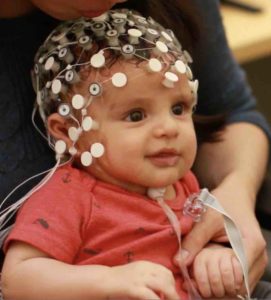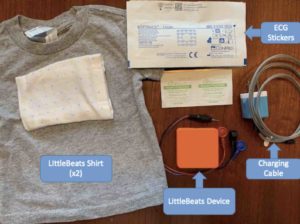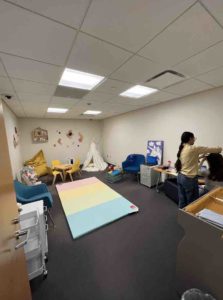Baby scientist wearing an EEG cap
What is developmental psychology?
Let’s start off with the basics! Developmental psychology is a branch of psychology which looks at how individuals change overtime, and tries to understand the mechanisms behind why these changes happen. It has important implications to understanding typical/atypical development, the adult mind, education and parenting, and even artificial intelligence and robot design.
The content that we cover in the Developmental Psychology module in second year is useful to give a basic introduction into executive functioning and language, emotional and cognitive development of infants, however I have found that the best way to learn is being in the lab and that I haven’t really been able to apply the course content of second year.
How is this studied at the lab?
Team photo of the lab, including research assistant, lab director and lab manager
I work at the Infant Studies and Language and Neurocognitive Development (ISLAND) Lab of New York University as a research assistant. Within ISLAND, I am part of a few different projects:
* COVID-19 and Perinatal Experiences (COPE) → Investigates the impact of the pandemic on parents and their children, began in March 2020 with pregnant mothers and has been recruiting families since.
My roles & responsibilities: being the Experimenter 2 at 6, 12 and 30 month in person and remote visits, coding the data from these visits, sending out participant engagement materials (such as reminder texts, birthday cards and emails), and finally sending out/receiving devices that we used to collect heart rate data.
*Stress, Home Environment, Language & Learning (SHELL) → Examines the influence of caregiver stress and child context on language and memory skills in early life
My roles & responsibilities: I am in charge of data re-entry, coding and syncing different data platforms. I also create master surveys, merging data from different timepoints.
*Online Remote Child Assessment (ORCA) →
My roles & responsibilities: help revise and develop interview questions based on the psychometric measure of CHAOS (Evans, 2006), and be Experimenter 1, conducting semi-structured focused interviews with participants.
What do research assistants do in developmental psychology research?
Developmental research is challenging because for the most part, our participants are non-verbal infants. Because of this, we need to use other strategies - such as technology or behavioral coding - to get answers to our research questions. One of the technologies that I am very involved in and find super interesting is called LittleBeats, essentially a heartbeat tracker that babies wear for 8 hours on a regular day at home. I help send this device out based on mom’s response to a survey, update an Infant Tracker, and when the package is sent back to use I update the SIM card data and clear the memory card.
LittleBeats device and rest of the kit
A big part of all our projects are participant visits, both in-person and remote. When they are remote, my responsibilities as an E2 (experimenter 2) are to support E1 by recording tasks that participants do. These differ based on the age of the child (6, 12, 15, 30 months) and one example is the still face paradigm. In still face, mothers are asked to play peek-a-boo with their child for five minutes, then turn to look at them with a blank expression for 2 minutes and then go back to peek-a-boo. Research assistants then code for positive and negative affect (displays of emotion), gaze (where they look predominantly) and self-comforting behaviours (such as sucking on their fingers, rubbing their feet together).
Finally, I have recently started attending in-person visits as an E2 for visits with 30-month old babies, and this is extremely exciting as we have direct contact with participants and are able to interact with the babies in between tasks or when the mother is occupied. I love this side of the research as it is exactly what I imagined when I applied to do research in developmental psychology! While there is more pressure when participants are physically in the lab as we have to set everything up before and make sure instructions are very clear, it is so enjoyable to see how each child's behavior differs!
Baby lab space used for in-person visits
Why is this research important?
Especially in a post-pandemic context, researching how babies are developing is really important, as well as the cognitive, emotional and social consequences of having lived through more than 2 years of a pandemic in very early life stages of infancy. I am so grateful to be part of this research at this time, as some mothers were first recruited in March of 2020 and we are now getting to a very crucial point in their child’s development which is very interesting. Make sure to follow the lab's website to keep up to date with new findings http://britobabylab.com/ , as we are currently still analyzing results! We also have an instagram @britobabylab which is updated regularly with what our lab is up to.
As always, thank you for reading and let me know if you have any questions at all about developmental psychology, interning as a research assistant or life as a student overseas in general!
Respond



